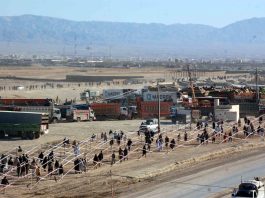Islamabad: On a bright and sunny day last April, the narrow streets of the small village of Zaida in Khyber Pakhtunkhwa province were clogged with local people. For two days, Pakistanis — from politicians to activists to ordinary people — had been talking about, and condemning, the murder of a young student named Mashal Khan. He was attacked and killed by a mob of his fellow students at the nearby Abdul Wali Khan University in Mardan who claimed he had committed blasphemy.
The protest in Zaida was a rare display. The villagers chanted slogans against an unjustified and brutal killing of a young man in the name of religion. The rally, made up of local residents, political workers, students, teachers and different civil society groups, shouted their condemnations. Marching in the main bazaar of the village, protesters chanted slogans, “Justice for innocent Mashal”, and “No to religious extremism”.
Though there have been protests against blasphemy in Pakistan’s big cities, including Lahore, Karachi, and Islamabad, such a public display in a rural and conservative area in support of someone accused of blasphemy is almost unheard of.
“It was first time that such a village in the province of Khyber Pakhtunkhwa, people got up against blasphemy laws misuse and condemned mob violence against the accused persons. They also expressed solidarity with the family of Mashal,” said Ahmad Khan, a young resident of the village. “it is hard to motivate people to stand up against religious persecution.”
Religion is a sensitive topic of discussion, and often people will default to believing a person accused of blasphemy has, in fact, said something objectionable, especially if a cleric tells them so, Khan said.
Ghulam Sarwar is a schoolteacher in Peshawar and is associated with Awami National Party, a political faction with socialist and secular views. He knew Mashal Khan’s family and joined the protest as a way to show them support. He came from Peshawar, almost one-and-half-hour’s drive away.
“People take law in their hands in the name of religion and state hardly reacts to their actions,” Sarwar said. “It seems our state has failed to stop extremist groups in society, especially those that incite violence in the name of religion, particularly, misuse of blasphemy laws. However, we are seeing now a realisation is growing in society that we should not allow misuse of such laws, and we and the state should react to those who incite violence in the name of religion.”
Religious extremist groups are targeting progressive voices, he said, “just like Mashal who was very active and a critic of religion, which should not be a crime,” said Sarwar.
“No religion allows this kind of brutal violence. Mashal was lynched. Nobody is allowed take laws into their own hand and if someone is accused of blasphemy, law should be allowed to take its own course.”
Mashal Khan and his family were known in his village for their love of education and deep thinking on important issues. His father, Iqbal Yousafzai, is known for his progressive poetry and socialist views.
Mashal Khan was from the Yousafzai tribe, born and raised in a family with very humble background. He studied civil engineering in Belgorod Shukhov State Technology University in Russia.
Mashal was dissatisfied with engineering, his father said. What Mashal really wanted was an intellectual pursuit. So he decided on journalism.
“He wanted to think, write and explore. That is why he told us that he is studying journalism as career,” his father said. “He was very bright and intelligent and we were supporting his studies despite limited means.”
Mashal Khan, 25, was an extraordinary student of journalism at Abdul Wali Khan University of Mardan (AWKUM), according to his teachers, including the chairman of the department, Shiraz Piracha.
“Mashal was an outstanding student with progressive thinking. He always used to talk about issues and problems around him; hold everybody accountable for his duties and liked to question others including teachers. He was extraordinary, intelligent, honest and aboveboard,” Paracha said.
“But he would have never thought that his critical thinking and habit of daring and questioning could lead him to become an alleged blasphemer. We never heard any such thing from him. It seems the allegation of blasphemy was planted against him to set personal score by inciting violence (against him) in the name of religion.”
On the afternoon of April 13, several hundred students gathered outside the department saying they heard that Mashal spoke against Islam and wanted to ask him about what he allegedly said. The situation escalated to the point where a mob, including some university staff, showed up at Mashal’s hostel in search of him.
They smashed through the plywood door of Mashal’s room and dragged him from third floor to the main entrance of the hostel. They also hit Mashal Khan with the clay flowerpots lying on the stairs of hostel entrance.
They accused Mashal of committing blasphemy saying he did not believe in Islam and Prophet Muhammad (PBUH).
One video clip, circulated on social media after his death, showed students, many with clubs in their hands, kicking and beating Mashal as he lay on the ground. The clip shows that the mob dragged and kicked his body after killing him.
In another video clip circulated on social media, some of the attackers were seen congratulating one another and clapping at his death and promising not to disclose the names of the key culprits.
Some of these videos show police officers and the university’s own security guards stood around and watched as the mob attacked and killed Mashal Khan, a university staff person said.
Pakistan’s blasphemy law is a holdover from the original British colonial law introduced in the Indian subcontinent in 1860. It was created to protect religious feelings and sanctity of religious places. In 1982, during the regime of General Zia ul Haq, the law was further amended to include defiling the Holy Quran and making it a crime punishable with life imprisonment.
Four years later, General Zia added life imprisonment for insulting the Prophet Muhammad (PBUH). In 1991, under the Nawaz Sharif government, the Pakistani Federal Shariat Court made the death penalty mandatory on conviction for the offence of desecrating the name of the Prophet Muhammad (PBUH).
“The frequent (mis)use of blasphemy law was witnessed after additions and amendments in the law in 1980s during the time of military dictator Haq,” said Peter Jacob, a researcher and writer, who earlier headed National Commission for Justice and Peace, a church-run organisation which focused on impacts of blasphemy laws in Pakistan. “We saw religious clergy using these laws to incite violence and people setting personal scores in the name of religion by lodging cases under the laws.”
In one case in 2010, a pharmaceutical representative accused a doctor in Hyderabad of blasphemy after the doctor threw the rep’s business card in the dustbin. The rep said since his first name was Muhammad, the doctor had committed blasphemy. A case was filed and doctor was arrested.
If the number of blasphemy cases were in the dozens before the amendments in the law in the 1980s, it went up to hundreds after that, said Jacob. He added that any effort to change the law is often met with protests and violence from religious groups.
Reema Omer, South Asia legal advisor to the International Commission of Jurists, stated, “In Pakistan, allegations of blasphemy are used as a pretext to attack people. It is similar to cow slaughter and allegations of eating beef in India. Often these allegations are fabricated, as was found in Mashal’s case as well. If there’s no explicit evidence of blasphemy or what people might perceive as blasphemy there is not much express support for this kind of violence. We see either silence, which could reflect tacit approval, or condemnation of the violence.”
She added, “But since there are often powerful interests involved in inciting and mobilising mobs, authorities either fail to prevent mob violence, or and as we see in both Pakistan and India, to prosecute and punish the perpetrators.”
There have been some attempts to address such violence. An offence of lynching was expressly included in the Anti-Terrorism Act earlier this year (2017), which carries a penalty of up to three years imprisonment. There are also laws that seek to hold police officers responsible where they are negligent in their duty to protect lives and disperse mobs.
Omer said there is also abuse inherent in the way the blasphemy laws are framed.
“What is blasphemy? This is a question even our courts in over thirty years’ jurisprudence have not answered. The vagueness of the text allows all kinds of conduct such as questioning the blasphemy law; bona fide critique of certain tenets of the Islamic faith; writing the name of the holy prophet on cloth etc. to be prosecuted under it. A former judge has publicly argued that even expressing dislike of a fruit liked by the prophet was blasphemy, liable for the death penalty.
“This is what makes the blasphemy law inherently abusive, and also allows it to be used as a convenient tool to prosecute people on false charges and even attack them,” she said. “Unfortunately, we see almost no progress or even debate – on reforming this aspect of the law – not from parliament, not the ulema, not the media and not even judges. And unless this question is addressed, the blasphemy laws will remain open to misuse.”
Following the death of Mashal Khan, there have been numerous debates on Pakistani television channels highlighting misuse of blasphemy; civil society groups protested and a large number of people from different walks of life expressed solidarity with the family of Mashal.
In one show on Geo Television, on April 17, one of the teachers of Mashal Khan cried while recalling the moments of his student’s death.
“Mashal texted on my phone that he was innocent and this was a plot made by some elements,” his teacher Ziaullah Hamdard said, crying and lamenting that he failed to rescue his bright student. “I would like to apologize to Mashal’s parents. I was unable to save him,” he said.
“I knew Mashal, and by the looks of it, I seem to be the only one who knew Mashal as the humanist he was… People are trying to paint him as an extremist: he was nothing like that. I hardly ever saw him without a book. I often visited his dorm and we had intellectual discussions: he wanted to know more about philosophy.”
Mashal’s death is one more in a long string of murders at the hands of lynch mobs. Pakistan has witnessed a number of mob lynchings in the name of religion, particularly, in blasphemy accusation, over the years.
According to Islamabad-based Centre for Research and Security Studies (CRSS), a think tank focusing on extremism, more than 70 people have been killed on accusations of blasphemy from 2005 to 2017. A week after Mashal Khan’s death, a violent mob tried to kill a mentally ill person in Chitral in Pakistan’s north, in the name of blasphemy. However, a local cleric who was warned about the mob’s intentions rescued the accused person immediately and sought the help of local police.
Later, at the end of May, violence also erupted in Lasbela district in Balochistan province where police refused to hand over a Hindu man suspected of blasphemy to an angry mob. Prakash Kumar, a local business owner, was suspected of sharing a picture containing allegedly blasphemous content on WhatsApp, according to police. A video circulating on social media shows hundreds people protesting outside a police station, while a cleric with megaphone, making fiery speech warning police to handover the accused to them.
Perhaps the most egregious example took place in August 2009 when a violent mob of a few thousand attacked a Christian Colony in Gojra, central Punjab. The mob burned houses causing the deaths of seven members of one family after they were trapped in their home. The accusation was the some children from Christian community in a nearby village were playing using some pieces of papers carrying some religious verses. Later, a government commission investigated the attack and found law enforcement agencies negligent.
In 2012, thousands of people beat a mentally disabled man to death, and burned his corpse after he was accused of desecrating the holy Quran in district Bahawalpur in south Punjab. The attackers stormed a police station where the man was being interrogated and took him in their custody.
After each of the violent incidents, however, the public unease with it has grown.
Saroop Ijaz, a lawyer with Human Rights Watch in Pakistan, says, “There is a realization growing in society that blasphemy laws are misused on occasion. What needs to be understood is that while Mashal’s case was a most horrible example of this law being used for victimization and persecution, for a greater shift of reform the lead has to be taken by the government and political forces.”
Ijaz added, “The fact that blasphemy is used as an instrument of violence and persecution against progressive voices and for personal reasons is becoming apparent to many and there is hope that this could lead to an honest national conversation and eventually reform.” Dialogue can change mindsets, and that’s key, he said.
In June, a report compiled by a 13-member Joint Investigation Team probing into the lynching of Mashal stated that a group in the university incited a mob against Mashal accusing him of blasphemy. The investigation’s report stated no proof was found that Khan had committed blasphemy.
According to the report, Mashal, being vocal, was a threat to some leaders of a student group in the campus. “Mashal had also been vocal about the rights of students at the university and even challenged the appointment of a new vice chancellor (VC) at the university to ensure that students were able to obtain their degrees, which is not possible without the VC’s signature,” the report mentioned.
Days before he was lynched by the mob, Khan in an interview to Khyber news channel spoke against activities at the university and the administration, the report said. The report also found that local police showed negligence in controlling the mob.
Back in Zaida village, Iqbal Yousafzi is waiting for justice to be done.
It will take all of society to work for a positive change, he said.
“It is a defining moment, and all segments of society – from elite to poor – will have to stand up for this collective cause. It is only first step towards justice and there is long journey ahead.
“We need to change this mindset. Otherwise we will be in immense loss,” he said. “I believe this is not my loss. This is our loss. And we have to stand up together and turn this grief into our strength.”
Editor’s Note:
This story was made possible by generous donations from 20 individuals to the Pakistan Shift project. For more information, or to contribute to coverage of important issues in Pakistan, please see the project page.



